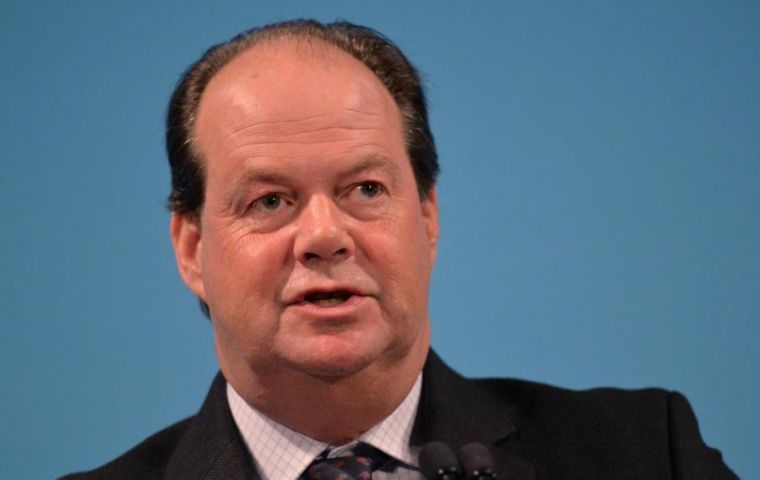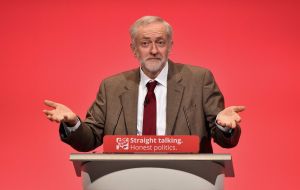MercoPress. South Atlantic News Agency
UK government defeated in Brexit key vote; ministers call it a “minor setback”
 Rebel MP Stephen Hammond said, “Tonight I put country and constituency before party and voted with my principles to give Parliament a meaningful vote”
Rebel MP Stephen Hammond said, “Tonight I put country and constituency before party and voted with my principles to give Parliament a meaningful vote”  Labour leader Jeremy Corbyn said the defeat was “a humiliating loss of authority” for Mrs May on the eve of an EU summit where leaders will discuss Brexit.
Labour leader Jeremy Corbyn said the defeat was “a humiliating loss of authority” for Mrs May on the eve of an EU summit where leaders will discuss Brexit. The British government has been narrowly defeated in a key vote on its Brexit bill after a rebellion by 11 Tory MPs. In a blow to Prime Minister Theresa May, MPs voted to give Parliament a legal guarantee of a vote on the final Brexit deal struck with Brussels.
The government had argued this would jeopardize its chances of delivering a smooth departure from the EU. Despite a last-minute attempt to offer concessions to rebels, an amendment to the bill was backed by 309 to 305.
However Ministers said the “minor setback” would not prevent the UK leaving the EU in 2019. Of the Conservative MPs who voted against the government, eight are former ministers. One of them, Stephen Hammond, was sacked as Conservative vice chairman in the aftermath of the vote.
“Tonight I put country and constituency before party and voted with my principles to give Parliament a meaningful vote,” he tweeted.
The government said it was “disappointed” at losing - its first defeat on Brexit - despite the “strong assurances” it had offered.
Labour leader Jeremy Corbyn said the defeat was “a humiliating loss of authority” for Mrs. May on the eve of an EU summit where leaders will discuss Brexit.
The defeat came after opposition parties joined forces with Conservative rebels during a heated debate in the Chamber on the amendment.
Critics accused those behind the amendment - which was authored by former attorney general Dominic Grieve and championed by other pro-Remain campaigners - of trying to “frustrate” Brexit and tying the government's hands.
After the result was announced, one of the rebels, former cabinet minister Nicky Morgan, tweeted: “Tonight Parliament took control of the EU Withdrawal process.”
But other Conservative MPs reacted angrily, with one, Nadine Dorries, saying the rebels should be deselected.
The Tory rebels were Mr Grieve, Heidi Allen, Ken Clarke, Jonathan Djanogly, Stephen Hammond, Sir Oliver Heald, Nicky Morgan, Bob Neill, Antoinette Sandbach, Anna Soubry and Sarah Wollaston. Another Conservative MP, John Stevenson, abstained by voting in both lobbies. Two Labour MPs, Frank Field and Kate Hoey, voted with the government.
The UK is due to leave the EU in March 2019, and negotiations are taking place on what their relationship will be like in the future. The EU Withdrawal Bill is a key part of the government's exit strategy. Its effects include ending the supremacy of EU law and copying existing EU law into UK law, so that the same rules and regulations apply on Brexit day.
MPs have been making hundreds of attempts to change its wording - but this is the first time one has succeeded. Unless the government manages to overturn it further down the line, it means a new Act of Parliament will have to be passed before ministers can implement the withdrawal deal struck with Brussels.
Ministers had made several efforts to placate the Conservative rebels, and argued that Mr Grieve's amendment would put unnecessary time pressure on the government if talks with the EU continued until the last minute. They had already promised a vote on the final deal and to enshrine the withdrawal agreement in an Act of Parliament.
But critics demanded a guarantee of a “meaningful vote” before the deal is agreed. They said the wording of the bill would allow ministers to bypass Parliament in implementing what is agreed with Brussels.
Speaking afterwards, the government said: “We are disappointed that Parliament has voted for this amendment despite the strong assurances that we have set out. This amendment does not prevent us from preparing our statute book for exit day. We will now determine whether further changes are needed to the Bill to ensure it fulfills its vital purpose.”
Justice Minister Dominic Raab said the defeat would not hold up the Brexit process.
“It's a setback but it's a fairly minor setback, it won't frustrate the Brexit process,” he said, adding: “It's not going to stop us leaving the EU in March 2019.”
Mr Corbyn said “Parliament has asserted itself” amid a “power grab” by the prime minister.
The European Parliament's chief Brexit coordinator Guy Verhofstadt tweeted: “British Parliament takes back control. European and British Parliament together will decide on the final agreement. Interests of the citizens will prevail over narrow party politics. A good day for democracy.”




Top Comments
Disclaimer & comment rulesCommenting for this story is now closed.
If you have a Facebook account, become a fan and comment on our Facebook Page!